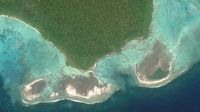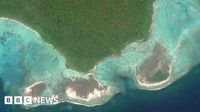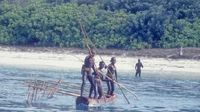In a shocking incident that highlights the risks posed by social media influencers to isolated tribes, a 24-year-old American tourist, Mykhailo Viktorovych Polyakov, was detained in India after illegally entering North Sentinel Island, home to the reclusive Sentinelese tribe. This event raises concerns about the safety of both the tribe and the individual involved.
On March 29, 2025, Polyakov embarked on a perilous journey from Kurma Dera Beach, traveling approximately 25 miles by inflatable boat to reach the forbidden island. His intentions, as reported, were to make contact with the Sentinelese, a group that has historically resisted outside influence and contact. Upon reaching the island, he spent about five minutes ashore, where he left a can of Diet Coke and a coconut as offerings, while also filming his visit.
According to police reports, Polyakov blew a whistle for about an hour in an attempt to attract the attention of the tribe, but he did not make any actual contact. He later returned to the beach, where local fishermen spotted him and subsequently reported his activities to the authorities. He was arrested two days later on March 31, 2025, and is currently being held for further interrogation.
The Andaman and Nicobar Islands police chief, HGS Dhaliwal, confirmed that Polyakov was presented before a local court and is on a three-day remand for questioning. He faces charges under the Foreigners Act of 1946 for unauthorized entry into a tribal reserve. The Indian government has strict laws in place to protect the Sentinelese, prohibiting any outsiders from approaching within three miles of the island to safeguard the tribe from external diseases and preserve their way of life.
Polyakov's visit is not an isolated incident; he had previously attempted to reach North Sentinel Island on two occasions, including a failed attempt in October 2024 where he was stopped by hotel staff. His fascination with extreme travel, including a recent trip to Taliban-controlled Afghanistan, has raised eyebrows about the influence of social media on reckless behavior.
Survival International, a charity advocating for tribal rights, condemned Polyakov's actions as "deeply disturbing," warning that such visits not only endanger the lives of the tribe but also put the visitor at risk. The organization emphasized that the Sentinelese have made their wish to remain uncontacted clear over many years, and any interaction could expose them to diseases to which they have no immunity.
Jonathan Mazower, a spokesperson for Survival International, pointed out that the rise of social media influencers poses a new threat to uncontacted tribes. He stated, "There’s a growing social media fascination with this whole idea," highlighting how influencers are increasingly drawn to remote and vulnerable communities for the sake of content creation.
The Sentinelese are considered one of the world’s most isolated indigenous peoples, with an estimated population of around 200. Their way of life has remained largely unchanged for thousands of years, relying on hunting and gathering for sustenance. Previous encounters with outsiders have often ended in violence, as seen in the tragic case of American missionary John Allen Chau, who was killed by the tribe in 2018 after attempting to preach Christianity to them.
In light of this recent incident, the Special Investigation Team (SIT) has been formed to assess the situation further and ensure the safety of the Sentinelese. They conducted a reconnaissance of North Sentinel Island from a distance, using binoculars to locate any items Polyakov may have left behind that could endanger the tribe's health.
Despite rough sea conditions, the SIT's operation was executed with caution, adhering to protocols designed to protect the tribe's privacy and safety. The police have seized Polyakov’s belongings, including his inflatable boat and GoPro camera, which contained footage of his landing on the island. Investigators are also probing into his previous visits to the islands and any potential local accomplices.
Caroline Pearce, director of Survival International, criticized the Indian authorities for not preventing Polyakov’s entry onto the island, stating, "It’s good news that the man in this latest incident has been arrested, but deeply disturbing that he was reportedly able to get onto the island in the first place." She urged the Indian government to take stronger measures to protect the Sentinelese from unwanted contact.
As this situation unfolds, it serves as a stark reminder of the delicate balance between cultural preservation and the allure of adventure tourism. The risks associated with such endeavors can have far-reaching consequences, not only for the tribes involved but also for those who seek to engage with them.
The Indian government has faced criticism in recent years for its handling of tribal protections, with activists urging for stronger enforcement of laws designed to safeguard indigenous communities. The Sentinelese, like many other uncontacted tribes, are vulnerable to exploitation and disease, making it imperative that their rights and way of life are respected.
As the investigation into Polyakov’s actions continues, it remains to be seen what legal repercussions he will face and how this incident will impact future interactions with the Sentinelese and other isolated tribes. The need for awareness and respect for indigenous rights has never been more pressing, as the world grapples with the challenges of globalization and cultural preservation.









